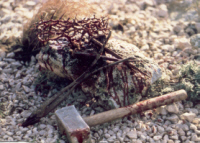|
†
Sacred Liturgy - Holy
Week |
|
Meaning of Holy
Week
 HOLY
WEEK has been held in great reverence since the very early
years of the Church. No other Christian observance has
interested the world so much as Holy Week. For the rituals
of the Church during these few days of each year, so complex
and so laden with meaning, emphatically and prophetically
proclaim to the entire world the liberating and redeeming
and perpetual truth of the Gospel the Good News that Christ
has died, Christ is risen and Christ will come again. HOLY
WEEK has been held in great reverence since the very early
years of the Church. No other Christian observance has
interested the world so much as Holy Week. For the rituals
of the Church during these few days of each year, so complex
and so laden with meaning, emphatically and prophetically
proclaim to the entire world the liberating and redeeming
and perpetual truth of the Gospel the Good News that Christ
has died, Christ is risen and Christ will come again.
As early as the fourth century, St. John Chrysostom referred
to Holy Week as The Great Week, "Not that it has more days
in it than other weeks, or that its days are made up of more
hours than other days; but we call it great, because of the
great mysteries which are then celebrated" [Homily 30, on
Genesis]. In other Christian cultures we find the week
before Easter referred to by several names such as the
Painful Week (Hebdomada Poenosa) because of the sufferings
of the Christ and of the fatigue and physical sacrifice
required of the faithful in observing them.
Although in our time and nation the Church's only required
food fast is to restrict meals (fast) and to abstain from
meat (abstinence) on Good Friday, we learn from medieval
Church documents that Christians observed a strict fast from
Monday of Holy Week to the cock-crow of Easter Day. A very
strict fast was usually observed from Thursday evening to
Easter morning.
History also tells us that early Christian rulers issued
decrees forbidding not only festive activities but also work
in trade, business, and the courts. Holy Week, it was
decreed, was to be spent in contemplation and meditation and
the faithful were be free from worldly concerns as much as
possible. (Clearly this was before anyone had the idea of
"separation of Church and State.")
Confession and the Easter Duty
The discipline of fasting from food is not the only nor even
the primary way in which we must prepare our entire selves
body and soul to receive the benefits of our Savior's
redeeming sacrifice. Physical fasting is not enough.
St. Paul warns us that "you cannot belong to Christ Jesus
unless you crucify all your self-indulgent passions and
desires" [Galations 5:24]. We are powerless to do this
alone. We must have God's help. In order to receive Christ
and in order to prepare ourselves for our responsibility for
His mission on earth, we must be drawn ever closer to Him in
prayer and action. But sin separates us from Him. We must be
convinced of our sins, repent, receive forgiveness and be
reconciled to God.
Through His Grace we must try to become holy, "perfect, even
as your Father in Heaven is perfect." This is why the Church
calls all her people, especially at this time of year, to
the Sacrament of Penance, to perform their Easter Duty. At
least once each year during the Easter season Catholics are
required to confess sins, receive absolution and receive
Communion in order to remain truly members of the the
Church.
This is what the Fathers of the Second Vatican Council, like
the early Fathers of the Church, tried to teach us with the
emphasis on personal awareness of how we have offended God
and need His forgiveness. As Pope John Paul II said "The
awareness of sin, in which the person knows before whom and
towards whom he is guilty, is an indispensable pre-condition
for obtaining the objective value of forgiveness. This is
because He against whom the sin is committed and who is
therefore offended is also the Father who has the power to
fogive it." And this is what the Church invites us no,
implores us to do during Holy Week.
This page is the work of the Servants of the Pierced Hearts of Jesus and
Mary
Copyright © 2006-2010 SCTJM
|